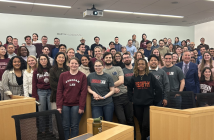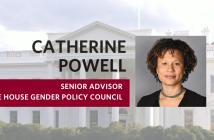Fordham Law’s Center on Law and Information Policy (CLIP) and the Commons Lab of the Woodrow Wilson International Center for Scholars issued a report titled “Privacy and Missing Persons after Natural Disasters,” (also available at Scribd) prepared as part of a joint project.
Persons after Natural Disasters,” (also available at Scribd) prepared as part of a joint project.
The report offers a roadmap to the legal and policy issues surrounding privacy and missing persons following natural disasters. It provides strategies that humanitarian organizations, private sector organizations, volunteers, and policymakers can pursue to help those affected by major natural disasters. For example, the report recommends that the United States government exercise existing legal authority to support appropriate sharing of personal information about missing persons following natural disasters. More broadly, the report recommends that those developing technologies to share information about missing persons implement design principles that carefully balance privacy consistent with existing legal obligations. The report also calls on privacy policymakers, legislators, and regulators to take steps to clarify how privacy rules apply to missing persons activities in identified key areas so that missing persons activities can proceed without the threat of legal liability.
“With this project, Fordham CLIP is trying to help the people and organizations assisting in the location of missing persons recognize and deal with critical privacy issues by providing a range of options to address the legal and policy concerns,” said Joel R. Reidenberg, the academic director of Fordham CLIP and a co-author of the report. Robert Gellman, a privacy expert and co-author of the report, added, “Missing persons services are essential following natural disasters, but they can raise questions about how privacy laws apply to emergency humanitarian responses. The report suggests ways to resolve those questions.”
The project is part of an international effort led by the Missing Persons Community of Interest (MPCI) that is seeking to harmonize a wide array of databases and technologies to enhance searches for missing persons following natural disasters. MPCI, which emerged in response to the 2010 Haitian earthquake, includes participants from local disaster management, international humanitarian relief organizations, private sector technology companies, nonprofits, and digital volunteer communities.
Tim Schwartz, the chair of MPCI, said the report “gives us for the first time a thorough analysis of how missing persons technologies impact individual privacy and provides us with a valuable framework that will help us refine these critical and complex systems.” Lea Shanley, director of the Commons Lab at the Wilson Center, added, “Response organizations and volunteer groups must work to find an appropriate balance between protecting privacy and safety, and facilitating critical information sharing about affected populations and missing persons during and after disasters. This research will inform the development of privacy guidelines and best practices.”
The report examined privacy issues created by missing persons activities following several recent natural disasters, such as the earthquake in Christchurch, New Zealand in February 2011 and Hurricane Katrina in New Orleans in August 2005. The report identified New Zealand as a leader in addressing the privacy issues that follow natural disasters and in prompting the world’s data protection authorities to pay more attention to those issues. The report discusses the New Zealand response and shows what other data protection authorities can do to provide clarity in applying privacy rules to missing persons activities.
Joining Reidenberg on the team that created the report are Gellman, a privacy and information policy consultant who previously served as chief counsel to the U.S. House of Representative Government Operations Committee and served as a member of the National Committee on Vital and Health Statistics at the U.S. Health and Human Services Department, Jamela Debelak, CLIP’s executive director, and CLIP student researchers Adam Elewa ’14 and Nancy Liu ’13.
The project was supported by the Wilson Center and a gift made by Fordham University alumnus and trustee Ed Stroz and his digital risk management company, Stroz Friedberg.


